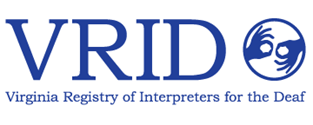Please note: This is not a VRID sponsored event and information is provided for informational purposes. Please contact event organizer for more information.
Interpreting in a Civil Courtroom Setting: A Mock Trial Experience
Friday, April 6 th , 2018
Saturday, April 7 th , 2018
Preregistration required and must attend both days
1.0 CEUs
Language of the workshop: American Sign Language & English
Workshop Description: This is a ten (10) contact hour training focused on interpreting in a civil courtroom setting during the implementation of a mock trial. Working collaboratively with the local court system and legal community, the mock trial will be staffed and implemented in a fashion that simulates what actually transpires in a courtroom. The target audience for this training event is certified Deaf and hearing interpreters who have completed introductory training in the area of legal interpreting and seek to gain hands-on experience in a simulated courtroom setting. This training is also open to students, non-certified interpreters, and Deaf Community members who can observe the mock trial as part of a ‘fish-bowl’ learning opportunity.
The matter addressed during the mock trial will be a child custody proceeding involving Deaf parents who are going through a divorce and each trying to gain primary custody of a Deaf child. This dynamic hands-on learning experience will provide certified practitioners with the opportunity to practice interpreting lines of questioning that arise during direct and cross examination, as well as exposure to the stages involved in a civil proceeding, and the related court personnel.
In the legal context—particularly in the instance of sworn testimony—the asking of questions by attorneys is a process impacted by legal parameters and legal strategy. And, the nature of questions changes between direct and cross examination. It is essential that interpreters are aware of these factors and possess the ability to generate accurate interpretations that conform to legal parameters and strategy, and to the fullest extent possible, preserve each throughout the interpreting process. One technique that can be used to ensure an accurate interpretation for the record is the use of consecutive interpreting during Deaf witness testimony. This is a critical skill for court interpreters and often involves the use of note-taking. This technique will be practiced as part of this training.
As well, working in court settings typically involves team interpreting. This too is part of the experience practitioners will gain during the mock trial—working with either a hearing or Deaf interpreting peer during the process.
Friday evening and the first hour of Saturday morning will focus on setting the theoretical foundation for interpreting in civil court proceedings and practicing some of the skills that will be applied during the mock trial. The remainder of Saturday will involve rotating teams of certified interpreters during the interpretation of various parts of the child custody proceeding.
At the end of the mock trial there will be a discussion that involves the legal personnel and Deaf and hearing witnesses involved in the event, along with the participants who interpreted and/or observed to discuss observations and questions. Participants will also receive a list of resources for continuing skill development related to this setting.
Presenter:
Anna Witter-Merithew, M.Ed., CSC, SC:L, OIC:C, SC:PA, CI and CT, is a heritage signer and legal interpreting specialist. Ms. Witter-Merithew served as the Interim Director of the Registry of Interpreters for the Deaf [RID] from March 2015 – August 2017. Prior to that she was the Assistant Director of the UNC DO IT Center and Director of the MARIE Center, where she worked for 16 years. She has co-authored two texts and over thirty-five peer-reviewed articles. Anna also served as the President and Vice President of RID, and the Vice President of CIT— which she helped to co-found in 1979.
Full flier is available here: mock trial revised.docx
